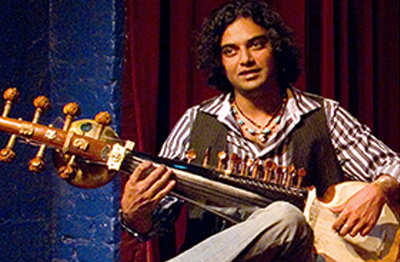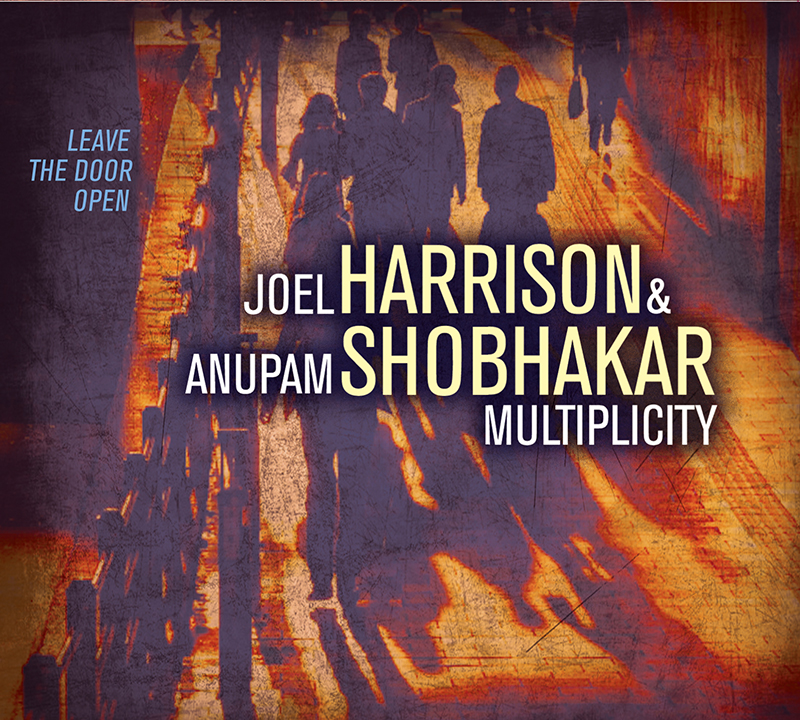Anupam Shobhakar (L)

Profile
Anupam Shobhakar is an Indian musician, composer, instrumentalist, record producer and classically trained Sarodist currently living in Brooklyn, New York. He has released three World Fusion albums, and one classical Indian music album. He has performed live around the world at various venues and for charitable causes. Shobhakar’s track “Water” made it to the first round of the Grammy Awards.
Shobhakar was born in the east Indian state of Kolkata (Calcutta), but was raised in India’s financial capital city of Bombay. Although Shobhakar’s parents are not musicians, they often played classical Indian records at home, which had an influence on Shobhakar. His grandfather, Shri Bhavani Shankar Shovakar, played sitar, tabla, and sang, hosting concerts at his residence.
Shobhakar’s first brush with Western Music was listening to Led Zeppelin and Deep Purple, followed by Megadeth and Metallica. He was given a guitar, which he strung lefty, and began practicing, eventually forming a band named Dead Sea Scrolls, which played Megadeth, Joe Satriani, and Steve Vai covers. During this same time (before the age of thirteen), Shobhakar began experimenting with Jazz and Western Classical Music.
In his early teens, Shobhakar began to listen to Indian Classical Music again — as he says, “What I was doing on the guitar was not enough to musically satisfy me. I heard a Shakti record . . . that re-ignited my interest in the deep melodic gravitas.” Shobhakar experimented by crafting a fretless guitar, but found that nothing could match the “microtonal subtleties of Indian Music” like the traditional Sarode.
Shobhakar’s first teacher was Suresh Vyas, who stressed practice and technical discipline. Shobhakar explains, “For three or four years it was only exercises – a lot of finger exercises, but no music. I got a little bit disillusioned, but that’s okay: the philosophy behind it is, first you get your hands entirely ready, so that when the music comes to you, you don’t have to worry about technique.” The intense training process is known as “tayarri.” He explains, “That word has been broadly translated as, like, ‘technically great’, but tayarri actually means ‘to be ready’. To be ready when the creative thing comes to you, your fingers, your mind, your body, and your soul must be exactly in place for you to execute it.”
Shobhakar met Ustad Aashish Khan briefly when he came to do a concert in Bombay and stayed at Shobhakar’s apartment. Shobhakar states that he was “blown away by Khan’s command over the Sarode,” and has been studying with him ever since. Shobhakar lists Khan, and his father, Ustad Allaudin Khan (guru to Ravi Shankar and Ali Akbar Khan), as his main playing style influences: “Slightly aggressive in approach, but never at the cost of the melodic charm.”
Shobhakar’s latest project is called Multiplicity, a collaboration with Guggenheim Fellow and world-renowned American guitarist Joel Harrison which mixes North Indian classical music fused with jazz, blues and roots material. The band also includes Dan Weiss (drums/ tabla), Hans Glawischnig (bass) and Gary Versace (keys). Their debut album is called Leave the Door Open and is released on Whirlwind Recordings.
Whirlwind Recordings






